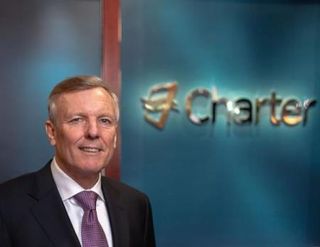Rutledge: Charter Will Overbuild Telcos, Not Cable

Charter Communications chairman and CEO Tom Rutledge set some cable hearts back on their regular beats Thursday, claiming that the third largest MVPD in the country has no intention of overbuilding cable operators as part of the conditions of its just-completed merger with Time Warner Cable and Bright House Networks, but instead will focus on telco broadband providers.
Among the conditions imposed by the Federal Communications Commission regarding its purchases of TWC and Bright House, Charter agreed to overbuild 2 million homes over a period of five years in markets outside its footprint.
The American Cable Association, representing smaller cable providers, had objected to that requirement, saying it potentially put small cable companies at risk of being "drive(n) out of the market" by the more economically powerful Charter.
At the MoffettNathanson Media & Communications Summit, though, Rutledge said the plan is to focus on telephone companies in its overbuilding strategy, not cable companies.
“When I talked to the FCC, I said I can’t overbuild another cable company, because then I could never buy it, because you always block those,” Rutledge said at the MoffettNathanson event. “It’s really about overbuilding telephone companies.”
Rutledge also told analysts the same in briefings at the INTX show in Boston earlier this week.
Rutledge said the conditions require that Charter build 2 million new passings over a period of five years, with 1 million of those passings against another high-speed Internet provider.
Multichannel Newsletter
The smarter way to stay on top of the multichannel video marketplace. Sign up below.
“If someone builds a housing development with 20,000 homes in it, there is a phone company in there, usually it’s AT&T, or Frontier in some markets,” Rutledge said. “Usually that plant is in the ground in the same trenches as yours, so you’re in a competitive environment.”
He added that the conditions also allow Charter to purchase up to 250,000 cable customers in the area that aren’t interconnected, which would be further incentive not to overbuild a cable system.
Asked by interviewer MoffettNathanson principal and senior analyst Craig Moffett that if other cable operators who had expressed concern over that particular provision may have misread the condition, Rutledge said overbuilding a cable operator would be business suicide.
“Why would we go where we could get killed,” Rutledge said.
Rutledge also provided some insight into the operator’s integration plans for TWC and Bright House, adding that Charter plans to hire an additional 20,000 people over the next few years. That is in addition to the workers being absorbed through Time Warner Cable and Bright House, something the Charter CEO has said in the past. Time Warner Cable had about 55,000 employees when the Charter merger was announced in May 2015 and Charter had about 24,000 employees at the end of that same year. Rutledge added that it should take about two years to fully integrate the companies.
